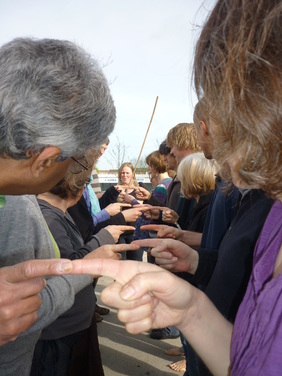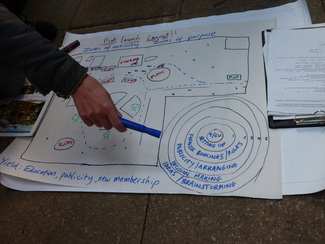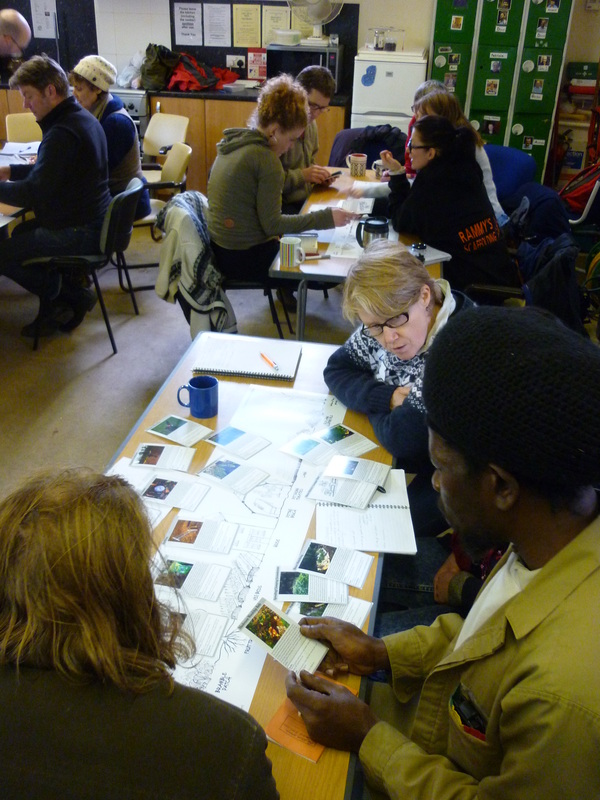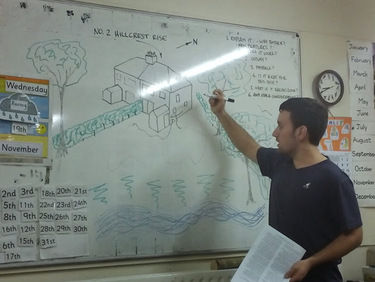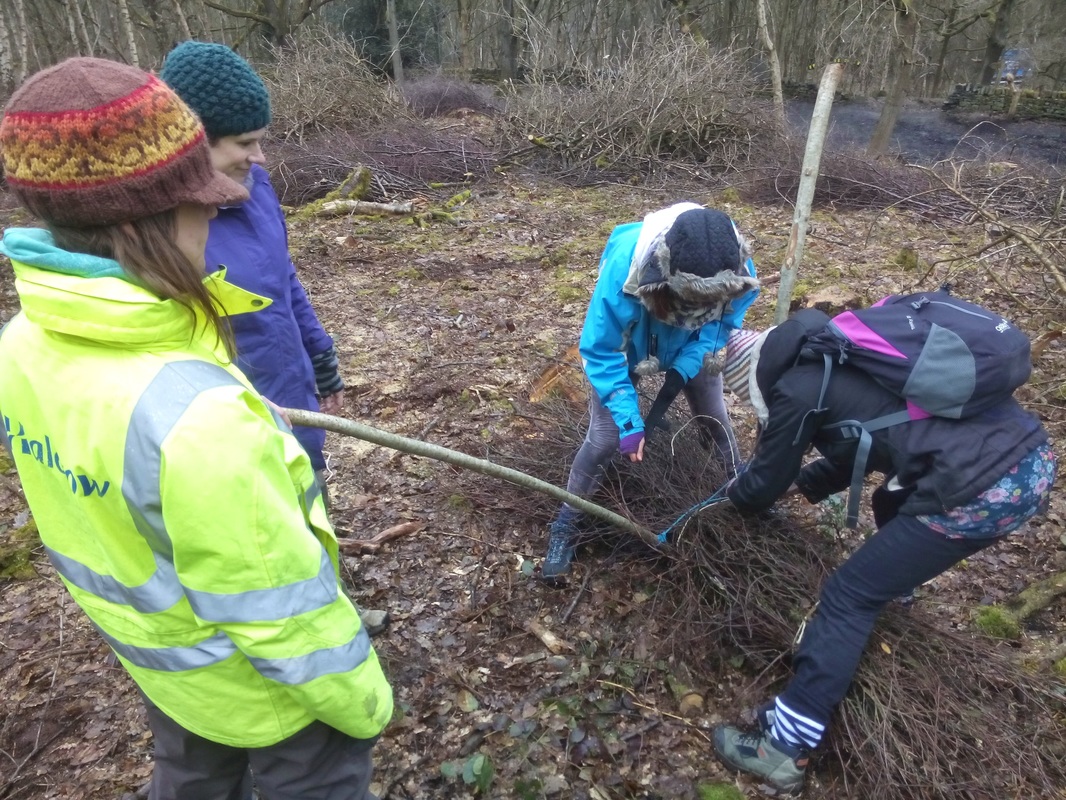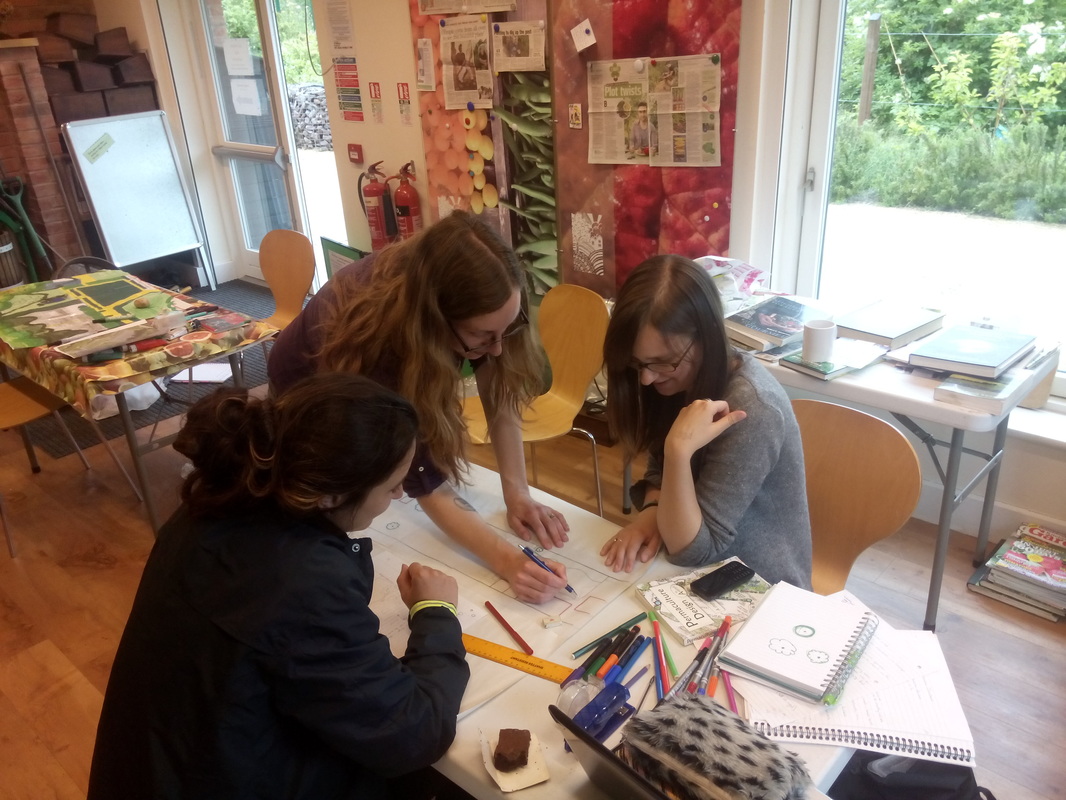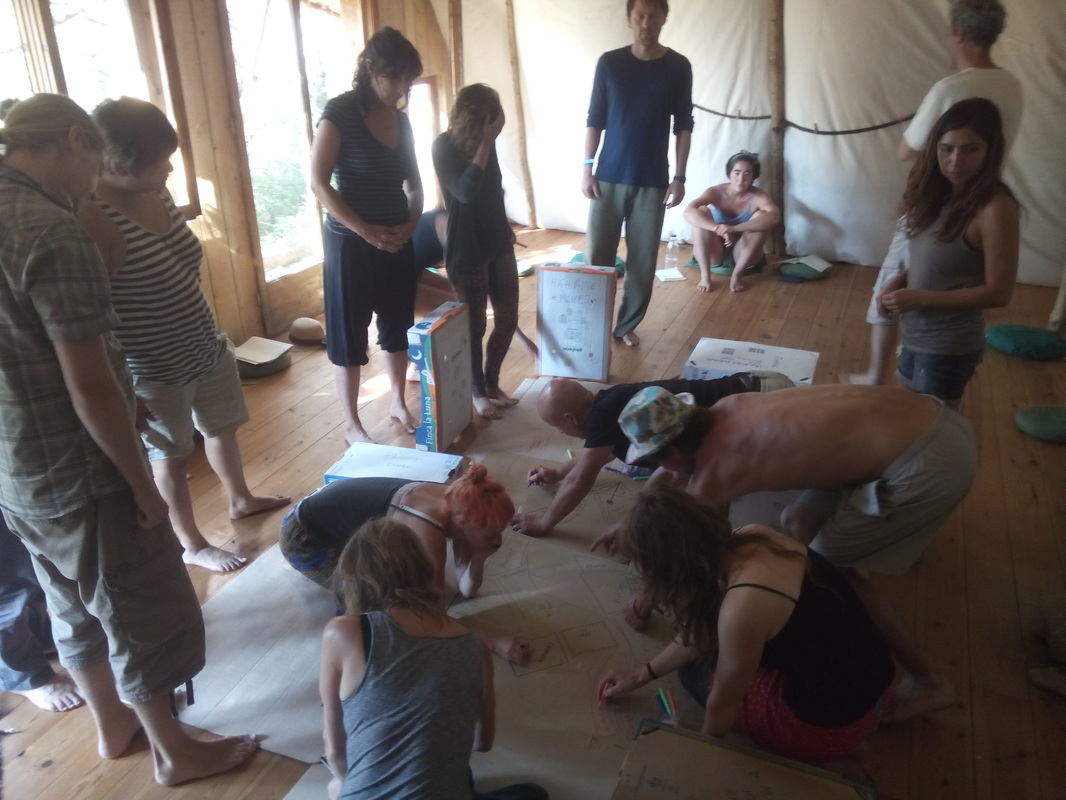Teaching Activities
"The mind is not a vessel to be filled but a fire to be kindled." - Plutarch
Students on the 2013 Nottingham PDC produced this film of their design project.
For me, one of the best ways to learn something is to teach it. I find
it puts me under pressure to do the necessary research to understand
the subject more deeply, while putting me in all sorts of situations where I can
develop that learning further. It also creates loads of opportunities
for interesting discussions with students and other teachers that may
deepen or challenge my understanding.
As the learning coordinator for the Permaculture Association, I also wanted to be able to understand all the issues facing permaculture teachers by walking in their shoes. The opportunity to earn some money from teaching and diversify my income was also attractive. I was already registered self-employed, so could put any teaching earnings through my business accounts.
I haven't applied a rigorous design process to my teaching pathway, but I have used some permaculture principles to guide my decisions along the way:
There follows a list of my teaching experience. I also attended 3 different permaculture Training of Teachers courses as part of my apprenticeship pathway.
As the learning coordinator for the Permaculture Association, I also wanted to be able to understand all the issues facing permaculture teachers by walking in their shoes. The opportunity to earn some money from teaching and diversify my income was also attractive. I was already registered self-employed, so could put any teaching earnings through my business accounts.
I haven't applied a rigorous design process to my teaching pathway, but I have used some permaculture principles to guide my decisions along the way:
- Observe & Interact: I watch what other teachers do and try to understand what works well, in which settings, and why. I started interacting by having a go at teaching quite early in the process, as action learning is really important for me, but my level of interaction developed gradually over time.
- Catch & Store Energy: I try to keep all of my old session plans & teaching resources in a relatively well organised system (this is a major challenge for me!), so that the time invested developing them isn't lost.
- Obtain a Yield: Try to gain something from every experience, even if it's just a "don't do that again" lesson. If possible, get paid for teaching work, but weigh up all the benefits: it might be worth doing something for free if it develops my skills & experience.
- Apply Self-regulation & Accept Feedback: Ask for feedback from students and pay attention to what it says. Go to great lengths to make sure they're comfortable giving negative/developmental feedback. Anonomyse if necessary.
- Use and Value Renewable Resources & Services: Don't try to reinvent the wheel. If I see another teacher doing something that works really well, I'll reuse it with my own spin on it.
- Design from Patterns to Details: When session planning I start with learning outcomes - what is the overall aim, then go into what might be the best way to learn the topic, then break it down into activities, timings etc.
- Use Small & Slow Solutions: It isn't a race to be able to lead my own PDCs. I want to become a good teacher, and to do that, I want to gain a range of experiences, reflect on them and gradually build up my knowledge & skills.
- Use and Value Diversity: try to apprentice for/work with a wide variety of teachers and steal ideas from as many as possible. This will build up my teaching tool bag more effectively than sticking with the same mentors/teams. At the time of writing (Dec 2013) I've worked with at least 10 other permaculture teachers, and learned something from each of them.
- Use Edges and Value the Marginal: I really enjoy teaching Introduction to Permaculture courses. I often find that attendees are just dipping their toe in the water, and have a lower commitment level than PDC participants. They are consequently more on the edge of permaculture, and can bring a more challenging, skeptical energy which can spark fascinating discussions & energetic exchanges. Also, be happy to take what could be seen as "backwards steps" in terms of pay/profile/status: they often yield surprising benefits. Be open to new/different opportunities to communicate permaculture beyond just running intro courses & PDCs.
There follows a list of my teaching experience. I also attended 3 different permaculture Training of Teachers courses as part of my apprenticeship pathway.
Teaching experience
Below is a chronological list of courses, workshops and lectures that I've delivered or supported and the role I've taken at each one.
Durham Introduction to Permaculture: Observer
May 2009, Harehope Quarry, County Durham.
One of the first things I did in my job as Learning Coordinator at the Permaculture Association was to go and observe an Introduction to Permaculture course. The first one that was happening anywhere near me was being led by Wilf Richards in Country Durham.
One of the first things I did in my job as Learning Coordinator at the Permaculture Association was to go and observe an Introduction to Permaculture course. The first one that was happening anywhere near me was being led by Wilf Richards in Country Durham.
Ripon Introduction to Permaculture: Observer/Apprentice Teacher
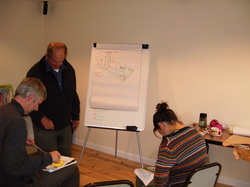 Students prepare their design
Students prepare their design
August 2009, Old Sleningford Farm, North Yorkshire.
Supporting Andy Goldring and Suzi High, I was mainly on this course as an observer, but did also get the opportunity to try some teaching. I led an observation exercise based on Patrick Whitefield's "listening to the landscape" session in the Permaculture Teachers' Guide and a treasure-hunt style activity exploring Holmgren's principles in Old Sleningford Farm's forest garden.
Supporting Andy Goldring and Suzi High, I was mainly on this course as an observer, but did also get the opportunity to try some teaching. I led an observation exercise based on Patrick Whitefield's "listening to the landscape" session in the Permaculture Teachers' Guide and a treasure-hunt style activity exploring Holmgren's principles in Old Sleningford Farm's forest garden.
Leeds Introduction to Teaching Permaculture: Apprentice Teacher
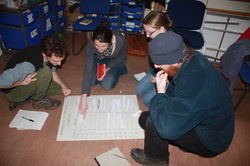 Students design the timetable for the course
Students design the timetable for the course
October 2009, Leeds.
Working with Andy Goldring & Suzi High, this was a weekend intro ToT - several ideas were borrowed from Designed Visions' 10-day course that I'd been on in July. Learners' progression route heavily suggested people go on a full ToT!
Working with Andy Goldring & Suzi High, this was a weekend intro ToT - several ideas were borrowed from Designed Visions' 10-day course that I'd been on in July. Learners' progression route heavily suggested people go on a full ToT!
Durham PDC: Observer/Apprentice Teacher
November 2009, Durham.
Having established a working relationship with Wilf Richards and enjoyed my time on his introductory course, I approached him to ask if I could act as an apprentice teacher on a weekend of his PDC that year. Wilf said yes and I delivered a session on ecological footprinting.
Having established a working relationship with Wilf Richards and enjoyed my time on his introductory course, I approached him to ask if I could act as an apprentice teacher on a weekend of his PDC that year. Wilf said yes and I delivered a session on ecological footprinting.
Leeds PDC: Apprentice Teacher
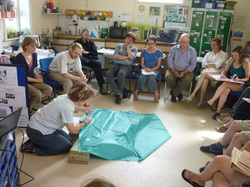 Helen presents her group's design
Helen presents her group's design
January - July 2010, Leeds.
I supported Andy Goldring, Niels Corfield & Joanna Dornan on the 2010 PDC in Leeds. As I was most of the way through my architecture MSc I felt confident leading the built environment section of the course. Several of the graduates from this course have gone on to initiate and/or support some very exciting projects in Yorkshire and beyond.
I supported Andy Goldring, Niels Corfield & Joanna Dornan on the 2010 PDC in Leeds. As I was most of the way through my architecture MSc I felt confident leading the built environment section of the course. Several of the graduates from this course have gone on to initiate and/or support some very exciting projects in Yorkshire and beyond.
Sheffield Introduction to Permaculture: Course Leader
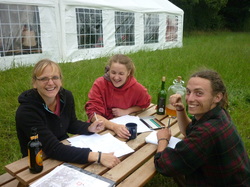 Students work on their designs
Students work on their designs
July 2010, Hazelhurst Community Supported Agriculture, Sheffield.
This was the first time I'd led an introductory course. It was an opportunity for me to trial the introductory course materials that I had developed from observing Wilf and Andy & Suzi's intro courses. This was useful for giving me feedback on how the course held together, and identifying any tweaks that had to be made. It was also my first opportunity to work with my own apprentice - Charlie Grey.
I ran the same course again a month later at the same venue with one or two tweaks. This time Debbie Jones acted as apprentice.
This was the first time I'd led an introductory course. It was an opportunity for me to trial the introductory course materials that I had developed from observing Wilf and Andy & Suzi's intro courses. This was useful for giving me feedback on how the course held together, and identifying any tweaks that had to be made. It was also my first opportunity to work with my own apprentice - Charlie Grey.
I ran the same course again a month later at the same venue with one or two tweaks. This time Debbie Jones acted as apprentice.
Introduction to Teaching Permaculture Workshop: Leader
August 2010, Nethen, Belgium
This was a 2 hour workshop that I offered at the European Permaculture Convergence. It explored the role of permaculture teacher, accelerated learning principles, and included a practical exercise where the participants delivered a "nano-teach".
This was a 2 hour workshop that I offered at the European Permaculture Convergence. It explored the role of permaculture teacher, accelerated learning principles, and included a practical exercise where the participants delivered a "nano-teach".
Introduction to Permaculture Workshop: Leader
September 2010, Slaithwaite, West Yorkshire
I was invited to deliver a 2 hour introductory workshop to members of the local community in Slaithwaite, West Yorkshire. This formed part of a day-long event that was run by the local Transition group, MASTT.
I was invited to deliver a 2 hour introductory workshop to members of the local community in Slaithwaite, West Yorkshire. This formed part of a day-long event that was run by the local Transition group, MASTT.
Sheffield PDC: Support Teacher
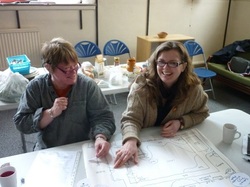 Students have a laugh while designing
Students have a laugh while designing
January - July 2011, Sheffield.
I supported Suzi High to deliver her first Permaculture Design Certificate course. As an increasingly confident teacher I was happy to step into a fuller role, leading many of the sessions.
I supported Suzi High to deliver her first Permaculture Design Certificate course. As an increasingly confident teacher I was happy to step into a fuller role, leading many of the sessions.
Leeds PDC: Support Teacher
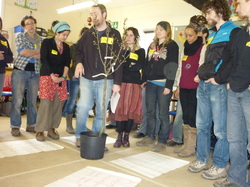 Leading a session on action learning
Leading a session on action learning
February - July 2011, Leeds.
Working with Andy Goldring, Niels Corfield and Joanna Dornan again. This time taking on a role somewhere between apprentice and support teacher.
Working with Andy Goldring, Niels Corfield and Joanna Dornan again. This time taking on a role somewhere between apprentice and support teacher.
Leicester PDC: Guest/Support Teacher
Ukraine PDC: Apprentice Teacher
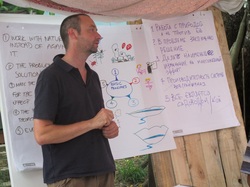 Teaching in Ukraine
Teaching in Ukraine
July 2011, Lubs'ke, Ukraine.
An amazing opportunity to act as an apprentice teacher to George Sobol on a 2 week residential course in Ukraine came up in 2011. The course was open to international students, so was delivered in English with live translation into Russian. This was my first experience of teaching on a residential course, first experience of working with live interpreters and first time teaching in a different cultural context. It was also an opportunity to learn from another very experienced teacher, to increase the diversity of my learning. George encouraged me to lead sessions that I'd never taught before and pushed me to develop a lot of new sessions.
An amazing opportunity to act as an apprentice teacher to George Sobol on a 2 week residential course in Ukraine came up in 2011. The course was open to international students, so was delivered in English with live translation into Russian. This was my first experience of teaching on a residential course, first experience of working with live interpreters and first time teaching in a different cultural context. It was also an opportunity to learn from another very experienced teacher, to increase the diversity of my learning. George encouraged me to lead sessions that I'd never taught before and pushed me to develop a lot of new sessions.
Leeds PDC: Support Teacher
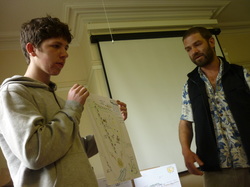 Gabe & Jack explain their design
Gabe & Jack explain their design
February - June 2012, Leeds
By now I was becoming a regular on the Leeds PDC with Andy & Niels. I became more involved in course design decisions such as timetabling, and taught about a third of the course.
By now I was becoming a regular on the Leeds PDC with Andy & Niels. I became more involved in course design decisions such as timetabling, and taught about a third of the course.
Nottingham PDC: Support Teacher
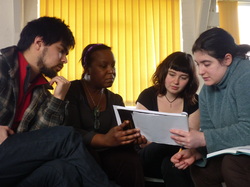 Nottingham students
Nottingham students
February - June 2012, Nottingham
Paul Paine invited me to support him to deliver the Nottingham course that he and Tomas Remiarz had delivered the year before. Neckie and I shared the teaching duties more or less 50-50, so this was an opportunity to develop a lot of new sessions. This was also the first time I'd worked for the WEA, which has become quite an interesting connection.
Paul Paine invited me to support him to deliver the Nottingham course that he and Tomas Remiarz had delivered the year before. Neckie and I shared the teaching duties more or less 50-50, so this was an opportunity to develop a lot of new sessions. This was also the first time I'd worked for the WEA, which has become quite an interesting connection.
Peterborough Introduction to Permaculture: Course Leader
|
April 2012, The Green Back Yard, Peterborough
The Peterborough Transition group wanted someone to lead an intro course with a view to running a PDC. Peterborough was really Hannah Thorogood's patch at the time, so I discussed it with her first to ask if she'd mind me leading the course, on the proviso that we could deliver the subsequent PDC together - Hannah as the diploma holder, me as support teacher. Hannah agreed and I delivered the intro course. Unfortunately the host project - The Green Backyard - was in a state of uncertainty and change at the time, and the PDC still hasn't happened (as of Dec 2013). |
Bewdley Introduction to Permaculture: Course Leader
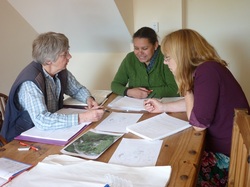 Students prepare their designs
Students prepare their designs
May 2012, Haye Farm, Bewdley, Shropshire
I had held a teachers' meeting at Haye Farm the previous year. Stuart Norgrove invited me back to run an intro course, again with a view to running a follow-up PDC, this time to be led by Tomas Remiarz. This was a nice opportunity to teach a course in a broadscale farming context, and in hindsight, I could have used the farm much more creatively.
I had held a teachers' meeting at Haye Farm the previous year. Stuart Norgrove invited me back to run an intro course, again with a view to running a follow-up PDC, this time to be led by Tomas Remiarz. This was a nice opportunity to teach a course in a broadscale farming context, and in hindsight, I could have used the farm much more creatively.
Leeds PDC: Support Teacher
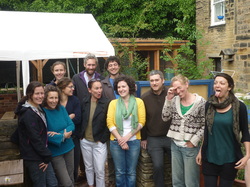
October 2012-June 2013, Leeds
Another Leeds PDC. A slightly longer format this time; 9 weekends with less content packed into them. However, the cohort was quite small this year, which left us wondering if the earlier start had had a negative impact on bookings.
Another Leeds PDC. A slightly longer format this time; 9 weekends with less content packed into them. However, the cohort was quite small this year, which left us wondering if the earlier start had had a negative impact on bookings.
Nottingham PDC: Support Teacher
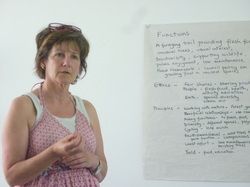 Nicola presents a forest garden design
Nicola presents a forest garden design
February - June 2013, Nottingham
Paul Paine invited me back for a second year supporting him on the Nottingham PDC. Some of the students produced the film at the top of this page as a way of documenting their design project.
Paul Paine invited me back for a second year supporting him on the Nottingham PDC. Some of the students produced the film at the top of this page as a way of documenting their design project.
Leeds Introduction to Permaculture: Course Leader
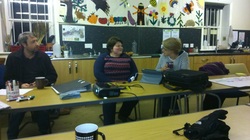 Marie & Laura went on to do the PDC
Marie & Laura went on to do the PDC
October - November 2013, Leeds.
This was an opportunity to run my introductory course as a night class through the Workers Educational Association in Leeds. I had been wondering for some time if there might be some latent demand for an evening course as many people find weekends difficult. The course was moderately well attended, so it remains unclear if this format has found a previously unexploited niche.
This was a good opportunity to get more experience of working with the WEA's systems, and to build connections with the WEA. Another interesting learning point that came out of this course was the challenge of teaching on winter evenings when it's dark outside. This made observation exercises interesting!
This was an opportunity to run my introductory course as a night class through the Workers Educational Association in Leeds. I had been wondering for some time if there might be some latent demand for an evening course as many people find weekends difficult. The course was moderately well attended, so it remains unclear if this format has found a previously unexploited niche.
This was a good opportunity to get more experience of working with the WEA's systems, and to build connections with the WEA. Another interesting learning point that came out of this course was the challenge of teaching on winter evenings when it's dark outside. This made observation exercises interesting!
York University BSc Environmental Geography: Guest Lecturer
November 2013, York.
An opportunity to talk about LILAC and permaculture presented itself at short notice. I took up the opportunity and delivered a guest lecture about individual sustainability through collective action, using LILAC as a case study and bringing in concepts such as permaculture and cooperatives.
An opportunity to talk about LILAC and permaculture presented itself at short notice. I took up the opportunity and delivered a guest lecture about individual sustainability through collective action, using LILAC as a case study and bringing in concepts such as permaculture and cooperatives.
Leeds PDC: Support Teacher
|
January - July 2014, Leeds
The annual Leeds PDC reutned to its format of running from January to June/July. A large group this time, including half of the participants from my intro evening class: really great to see people keen to progress their learning. A couple of LILAC members as well, which is particularly gratifying, as it means that one of the strategies in my LILAC landscaping design is working. |
Nottingham PDC: Support Teacher
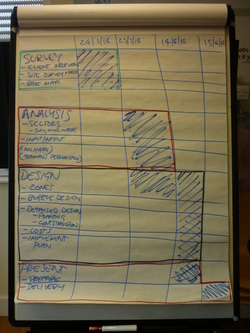 Design process recap/project planning
Design process recap/project planning
January - June 2014 Nottingham
Now a regular on the Nottingham PDC, and increasingly making links with the Nottingham permaculture network.
Now a regular on the Nottingham PDC, and increasingly making links with the Nottingham permaculture network.
Hull Introduction to Permaculture: Course Leader
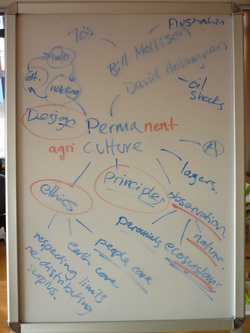
March 2014, Hull
I led an Introduction to Permaculture course for Transition Hull via the Workers Educational Association in March 2014.
The course was very well attended and led to the formation of a local permaculture network who are holding regular meetings. I have been invited back to lead another intro course, and potentially a PDC in future.
I led an Introduction to Permaculture course for Transition Hull via the Workers Educational Association in March 2014.
The course was very well attended and led to the formation of a local permaculture network who are holding regular meetings. I have been invited back to lead another intro course, and potentially a PDC in future.
